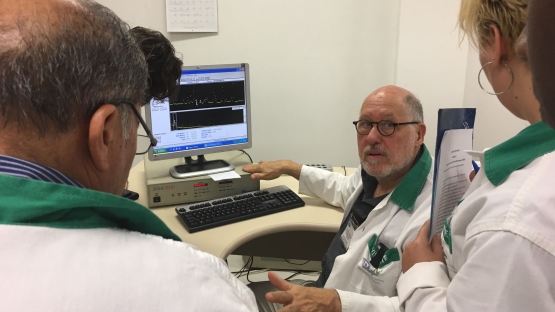Nine professionals from Brazil, Chile, Jamaica, Mexico and Peru, as well as experts from Argentina, the Republic of Korea, the United States of America and IAEA personnel, have shared experiences, lessons learned and good practices in education and training using research reactors at a recent IAEA regional training course in Brazil in September.
The two week regional training course, designed to train future trainers, was delivered under a regional technical cooperation project[1] and held in cooperation with the Government of Brazil through the Nuclear and Energy Research Institute (IPEN) and the Centro de Desenvolvimento da Tecnologia Nuclear (CDTN). It was conducted in two different research reactors with different power levels and utilization profiles to address this challenge.
The first week of the course was held at IPEN’s IEA-R1 MTR-type reactor (5 MW) in São Paulo, and the second week took place at CDTN’s IPR-R1 TRIGA-type reactor (100 kW) in Belo Horizonte. The course included lectures, round table discussions and hands-on or demonstration experiments using research reactors. Training focused particularly on safe operation, maintenance and utilization of research reactors. The opportunity to share experiences and lessons learned has provided important feedback on national training programmes, and will contribute to improving and extending participants' training practices.
“Without a doubt, when this project is concluded the participating countries will be in a much better position due to the knowledge shared”, said Frederico Genezini, Director of the Research Reactor Center.
A new e-learning course on neutron activation analysis was presented as an efficient way of transferring know-how to newcomers, such as students or new staff at research reactors, who can complement the e-learning with practical experience and interaction with colleagues from their laboratories and even other countries.
Denet Soler, from the Comisión Chilena de Energía Nuclear, said that “I believe this is a tremendous opportunity for everyone, and we will return home with many ideas that we can implement in our countries”. She concluded that this was also an opportunity to show that there are many women working in the nuclear area.
As part of the training course, participants also took an exam, not only to assess and solidify the experience and knowledge obtained, but also to identify good practices and methodologies for the evaluation of trained personnel.
The train-the-trainers approach allows for more efficient distribution of efforts, resources, and time in connection with personnel training. Future national trainers are gaining necessary skills in development sustainable and effective education and training programmes, multiplying the effect of training.
At the end of the course, Luiz Claudio Andrade Souza, Senior Operator at the TRIGA IPR-R1 Research Reactor, CDTN, declared that: “Co-hosting this event was both an honour and a pleasure for us at CDTN. We, as in the research reactor community, should value every opportunity to share knowledge and experiences, so that we may not only endure but thrive, better serving our purpose”.
"Without a doubt, when this project is concluded the participating countries will be in a much better position due to the knowledge shared."




